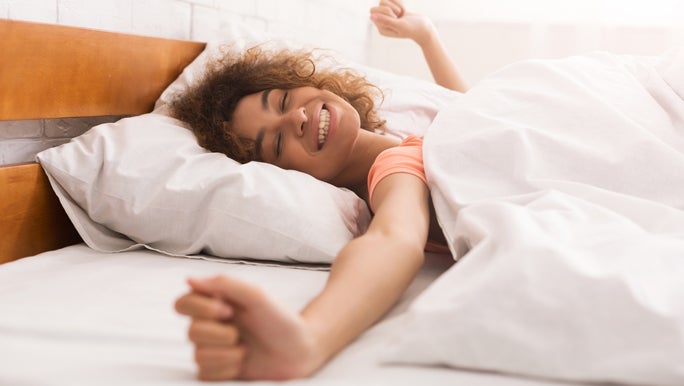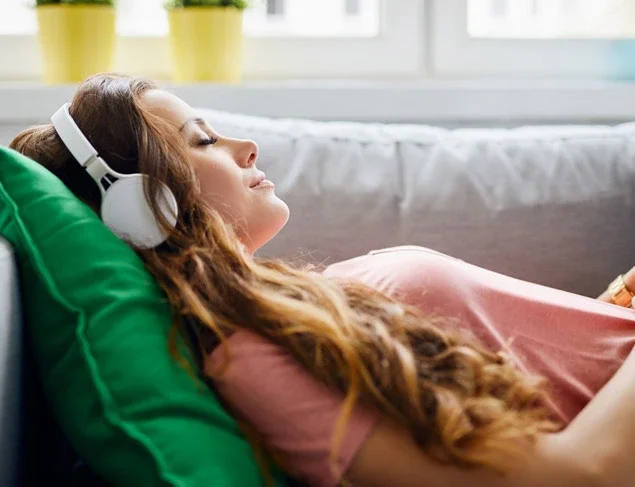Tired of tossing and turning? You're not alone. Quality sleep is key to feeling your best, yet sometimes it can be surprisingly hard to come by.
We’ve compiled 10 science-backed tips to help you catch those much-needed Z's (in no particular order, because there’s no scientific way to rank sleep tips by importance!). From light exposure to bedtime rituals, these strategies are designed to fit your unique lifestyle and help you sleep soundly.
Ready to transform your nights and wake up refreshed? Dive in and discover how to tailor these tips to your life. Your journey to better sleep starts now.
Tip 1: Manage your light exposure
The science: Melatonin is a sleep hormone that is needed for sleep, and bright light can have an effect on suppressing melatonin. Therefore when we’re in the light and when we’re in the dark can be a significant factor in regulating our sleep. Numerous studies over the past decade particularly have shone a light on the important role light plays in regulating sleep and health. It is important to be aware that there are a lot of individual differences in the way people respond to light.
Tip: If you are aware that we need dim light conditions (i.e. not sitting in a very brightly lit room) to enable our melatonin to be produced and to help kick start our sleep and you’re also aware that bright light suppresses melatonin then be in the dark and the light according to what you need to do with either being more alert or trying to be sleepy. This will depend on the time of day, whether you’re a shiftworker and whether you’re ready for sleep.
Tip 2: Keep regular and consistent routines with your sleep
Science: New international guidelines were released in 2023 highlighting the importance of regular routines for being able to have good consistent sleep. Just as important as how many hours you are sleeping is the notion of how regular you are with your sleeping patterns. Regularity in sleep patterns with consistent bedtimes and wake-up times are favourably associated with health.
Tip: Aim to go to bed around the same time most nights and get up about the same time each day. Nonetheless, when insufficient sleep is obtained during the week/work days, weekend/non-work day catch-up sleep may be beneficial, and it’s best to limit that to an extra 1-2 hours only.
Tip 3: Finish eating meals 2-3 hours before bedtime.
Science: Scientists now know a lot more about sleep and there is a strong relationship between what we eat, and when we eat it, and the quality of our sleep. Certain foods and drinks may lead to less sleep or lower quality sleep. The following are foods and diets that may contribute to worse or less sleep:
- Foods and drinks containing caffeine
- Foods and drinks containing alcohol
- High-fat foods, especially saturated fat
- High-sugar foods
- Foods low in tryptophan
- Diets low in fibre
- Diets high in carbohydrates and low in fat
Tip: Be aware of the foods and drinks that can disrupt your sleep. If you’re too full or too hungry, sleep could be impaired so it’s recommended that you leave at least 2-3 hours after you’ve had a big meal before you attempt to sleep. You might want a small light snack to prevent you from being hungry in the night.
Tip 4: Limit caffeine intake
Science: Caffeine and its relationship to sleep has been studied for many decades with varying results. It has been found that caffeine should be avoided about 8 hours before bedtime as it can be disruptive to sleep. Caffeine promotes alertness by inhibiting chemicals in the brain that promote sleep. Caffeine is absorbed rapidly into the bloodstream and reaches peak levels within 30-70 minutes. Its effects can then last 3 to 7 hours, but it may take up to 24 hours to fully eliminate caffeine from the body.
Tip: Therefore the main tip is to ensure that you are careful about your caffeine intake at least 7 hours before bed, and also don’t forget to use it in appropriate amounts to help you stay awake during times of low alertness. The Food and Drug Administration (FDA) in the USA indicates that it is generally safe for adults to consume up to 400 milligrams of caffeine per day (note there may be people sensitive to caffeine and they should avoid it). As long as recommended doses aren’t exceeded you can feel free to use caffeine to help manage your sleepiness and wakefulness.
Tip 5: Be mindful of alcohol intake
Science: How much alcohol you drink and when you drink it can both influence sleep. As you consume alcohol, it is rapidly absorbed into your bloodstream, where it remains until your liver is able to metabolise it, typically at a rate of about one drink per hour.
If you have alcohol in your bloodstream when you go to sleep, you might fall asleep more quickly but you are likely to wake up more and also experience disruptions to your sleep stages, that is how your body cycles through the from wake to lighter stages, deeper stages and REM sleep. Low amounts of alcohol(less than 2 drinks) decrease sleep quality by 9.3%. Moderate amounts of alcohol (about 2 drinks) decrease sleep quality by 24%. High amounts of alcohol (more than 2 drinks) decrease sleep quality by 39.2%.
Tip: It is recommended that you avoid alcohol for at least three hours before bedtime, or avoid it altogether in order to enhance sleep quality.
Tip 6: Exercise regularly for improved sleep.
Science: Many studies have explored the link between exercise and sleep, and most conclude that certain types of physical activity improve sleep quality and duration. It depends on the type and the timing of the exercise.
Tip: Exercise regularly, and although any exercise is better than none, morning exercise has been shown to be the best for sleep. Activities like walking, swimming or yoga, are helpful for managing pain and stiffness and improving sleep.
Tip 7: Find a sleeping routine that works for you
Science: A lot of shift workers try to adapt standard advice to their non-standard sleep/wake patterns. However, standard advice such as going to bed and waking up at the same time every day is not practical and can be frustrating to hear for people doing non-standard hours. Specific guidelines have been developed for shift workers.
Need a power nap? Here's how they may help – but not for everyone
Power naps have been found to offer benefits for some, but a recent study suggests that power naps may not be so powerful after all. Here’s why...
Tip: Make the most of napping and caffeine to suit you and your shifts and experiment with what works best for you to maximise your sleep and wellbeing. It might take several weeks or even a few months but once you’ve found the best routines and patterns stick to these!
Tip 8: Set a relaxing pre-bed routine.
Science: Those who follow bedtime routines are more likely to go to sleep earlier, take less time falling asleep, sleep longer, and wake up less during the night. Bedtime routines are a consistent, repetitive set of activities that are carried out before bed every night. They help prepare both children and adults for sleep via creating a relaxing and calming environment. A predictable routine also can train the brain to have higher levels of confidence that sleep is coming. Instilling good calming routines in children has been shown to carry on into adulthood.
Tip: The power of a good ‘unwinding’ period is often overlooked. Try to incorporate a relaxing routine before bed where you can ‘unplug’ and enjoy activities such as listening to calming music, reading a book or taking a warm bath.
Tip 9: Value your sleep and make enough time for it
Science: This is more of a social science matter! Professor Colin Espie from Oxford university in the UK was asked by Public Health England (PHE) to work with them on their mental health campaign Every Mind Matters. This was to be an online and social media campaign with the call to action “Feeling stressed, anxious, low or struggling to sleep?” After decades of being a sleep expert he decided he couldn’t come up with the top 5 tips but rather top 5 principles. The starting point for the ‘5 Principles’ lies in valuing sleep. This is because there is a fundamental problem for achieving and sustaining sleep health if a person does not regard sleep as a ‘need to have’, compared with a ‘nice to have’. It is absolutely crucial not to cut corners where sleep is concerned. Even if your sleep is curtailed due to family and work demands when you value it, you will put things in place to at least attempt to get adequate amounts of sleep.
Tip: Ask yourself, do you value sleep over and above work and streaming services? If you value sleep then it will be given high priority and you are more likely to get enough. Place it as one of the things you value most about your health.
Tip 10: Look at your sleeping enviroment
Science: The science of the best mattress and pillows is not yet conclusive as there are many individual factors that affect your comfort and a great deal relates to personal preferences. But it is logical that you need to be comfortable and there is strong science around the sleeping environment needing to be dark, cool and quiet.
Tip: Ensure your pillow is not older than 2-3 years old and that mattresses are no older than 8-10 years old. Different pillow and mattress materials deteriorate at different rates, so depending on what your pillow/mattress is filled with, you might need to replace it more often. Sleep in a room without lights on (and curtains/blnd son the windows), sleep in a room approximately 18 degrees celsius, and do what you can to sleep is as quieter a room as possible.
Summary
When it comes to sleep tips, it's crucial to remember that one size doesn't fit all. Factors like your age, gender, work schedule, and whether you have a baby at home can all impact your sleep. Sleep is varied and complex, so advice needs to be tailored to your unique circumstances and what's actually disrupting your rest.
That’s why it’s essential to understand the root cause of your sleep difficulties before exploring solutions. Start by being your own personal scientist—pay attention to what might be causing your sleep issues. This self-awareness can guide you in making the necessary changes. If you’ve tried for weeks or months without success, it’s important to talk to a healthcare professional for personalised advice.
Related:
Reviewed by healthylife Advisory Board July 2024

